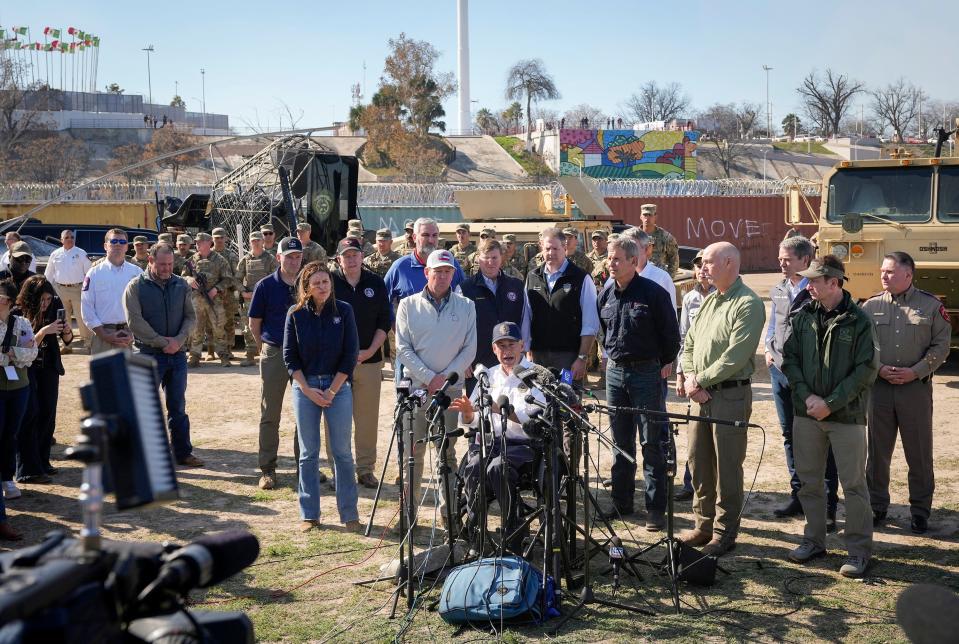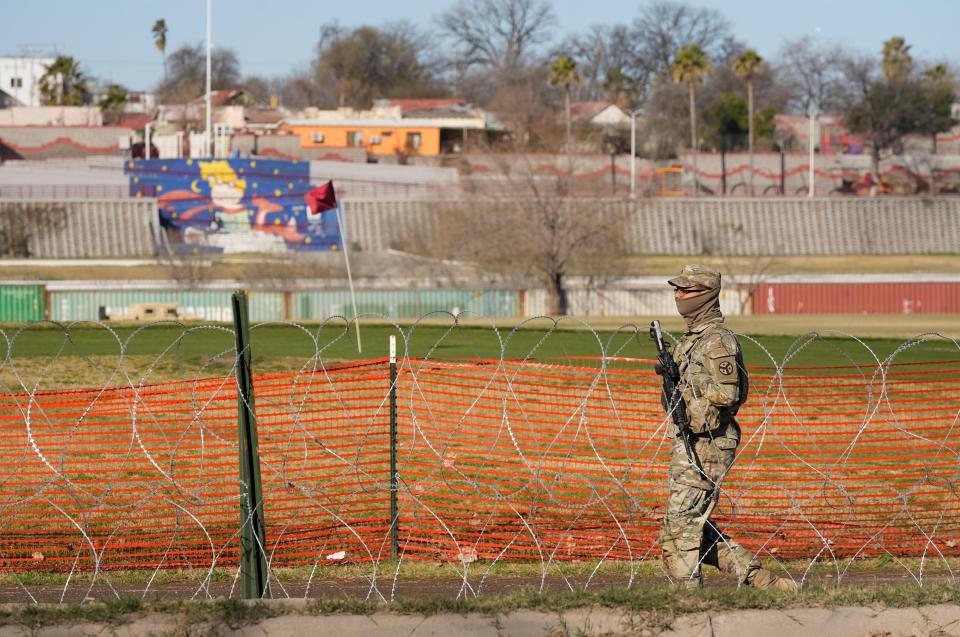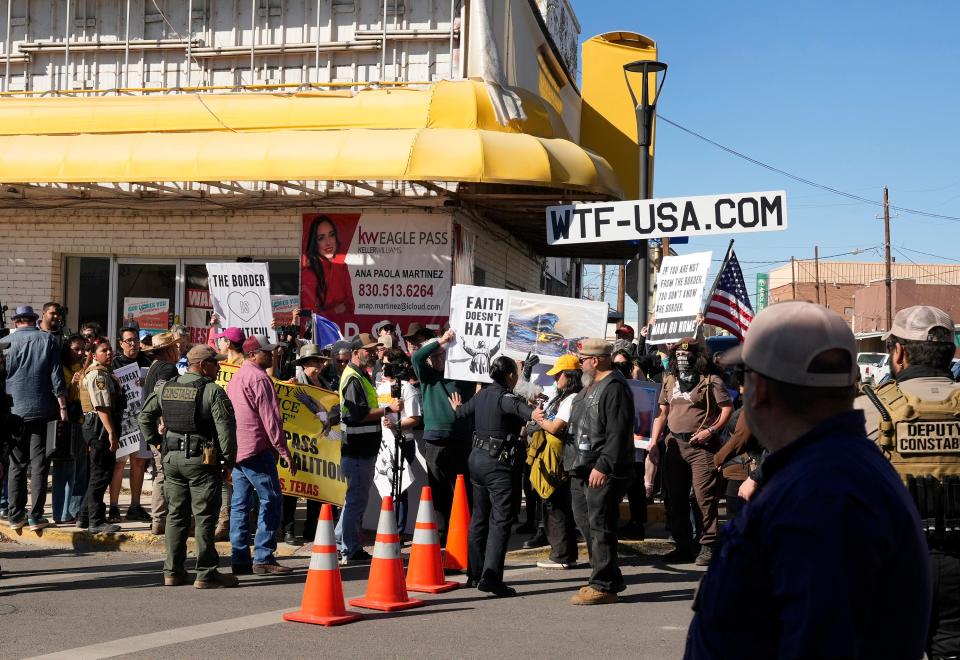How the border crisis sparked the worst Texas-federal relationship in modern memory
- Oops!Something went wrong.Please try again later.
- Oops!Something went wrong.Please try again later.
When Gov. Greg Abbott, flanked by about a dozen of his fellow GOP state chief executives and backed by armed National Guard soldiers near the banks of the Rio Grande in Eagle Pass on a recent Sunday afternoon, it was more than just another example of the Texas Republican chastising the Democratic president over immigration policy.
Instead, it was further evidence that Texas' relationship with the federal government — often strained and frayed during their 179 years together — might be at its lowest point since the dawn of the Civil War. And Abbott's rhetoric in Eagle Pass on Feb. 4, along with the imagery assembled for the bank of news cameras, invoked a pugnaciousness worthy of a military commander preparing his troops for battle.
"We are here to send a loud and clear message that we are banding together to fight to ensure that we will be able to maintain our constitutional guarantee that states will be able to defend against any type of imminent danger or invasion," Abbott declared.

Former Lt. Gov. Ben Barnes, whose political career began more than 60 years ago and whose political involvement has endured since, said he has seen plenty of Texas-federal dustups over the decades but when asked if the one presently playing out is more destructive than the others, he said, "I believe it is."
Immigration and border policy lay at the heart of the conflict between Abbott and Biden. But the acrimony is not limited to their partisan differences or to the back-and-forth sniping since Biden ousted then-President Donald Trump from the White House three years ago. Texas and the Biden administration are locked in myriad legal battles over the federal government's historic primacy over immigration laws and over whether the state can usurp immigration enforcement authority if it deems the federal effort to be inadequate.
Barnes, now 85, entered politics just as the U.S. civil rights movement was gaining momentum. In an interview with the American-Statesman, he said the issue of school integration and efforts to expand voting rights often put Austin and Washington at cross purposes because Jim Crow laws — rules states in the former Confederacy enacted to mandate racial segregation — were alive and well in the Texas of the 1950s and early 1960s.
"I think a difference is the battle over civil rights had been going on since before the Civil War, and at the conclusion of the Civil War, and in the aftermath of the Civil War," Barnes said. "But this (the escalating tensions over border policy) is something that's been going on not (for) 100 years, but only the last six or eight years. This has happened rather quickly."
Another conflict rooted in 'states rights'
Bill Minutaglio, the author of several books on different periods of Texas history, said one thread ties together nearly all the conflicts pitting the state against the feds.
"Texas has a long, complicated controversial history arguing for states' rights. Period. Full stop. End of story," said Minutaglio, a retired University of Texas journalism professor. "Obviously, it goes all the way back to (Texas) being a republic, its own nation. And then being absorbed into the United States, and then willfully joining the secession and arguing that states' rights and primacy and all that during the Civil War."

The notion is not unique to Texas, Minutaglio said. All the states that left the union at the outset of the Civil War embraced the theme, and they continued doing so through Reconstruction, the period after the war. Resistance to federal civil rights laws of the mid-1960s has extended that embrace, he said.
But, Minutaglio added, "the Texas mythology (as) a place that can never be tamed and never be conquered and can't be corralled in" elevates the state's role whenever states and the federal government are at odds. "We play into that more than any other state."
More: Senate kills sweeping border, foreign aid deal – even as lawmakers eye Israel, Ukraine funding
Texas, White House ratchet up the rhetoric
The present acrimony between Abbott and the federal government is by no means one-sided.
As recently as last month, Biden White House press secretary Karine Jean-Pierre accused Abbott of engaging in "extreme political stunts" in the name of border security.
As part of the $11 billion Operation Lone Star, Abbott's border security initiative, Texas has continued building unconnected sections of border wall, laid a buoy barrier along a part of the Rio Grande and installed razor wire on the river's Texas shore.
More: Abbott vows to keep border security fight after Supreme Court rules feds' can cut razor wire
"I’ve said this over and over again. We have said this: It demonizes and dehumanizes people," Jean-Pierre said at a news briefing Jan. 16. "But it also makes the job of the Border Patrol harder and also more dangerous. That’s what we’re seeing."
In July, she called Abbott's border actions "atrocious, barbaric, and downright wrong."
Abbott has countered by accusing President Joe Biden of violating his oath of office. "The federal government has broken the compact between the United States and the States," the governor said in a Jan. 24 one-page denunciation of the administration's border policies, which was quickly endorsed by 25 other Republican governors.
Immigration politics mixes with courtroom drama
Amid the verbal parrying are legal cases that are fraught with acrimony, and ones that could upend the centuries-old principle that the states must bow to the federal government on immigration and border security.
The Biden administration last month won at least a short-term victory when the U.S. Supreme Court said federal border agents could cut through the miles of razor wire the state has coiled along the Rio Grande.
More: Texas Democrats in Congress say SB 4 is unconstitutional. Here's what they're doing about it
But the larger case of whether the law Texas enacted last year to allow state law enforcement authorities to arrest people suspected of entering the country without legal authorization has not yet been adjudicated. The law, known as Senate Bill 4 and set to take effect next month, carries a penalty of six months in jail or court-ordered deportation from the United States.
Should Biden federalize the Texas National Guard?
The U.S. Justice Department, which filed the lawsuit seeking to have SB 4 struck down, is arguing that the high court's ruling in 2012 nullifying a similar law enacted in Arizona has settled the question of federal supremacy when it comes to immigration and the border. If the Supreme Court sides with Texas, it could mean that other states can enact their own laws similar to SB 4.

Meanwhile, several prominent Texas Democrats are calling on the Biden administration to take more aggressive actions to rein in Abbott and other state Republican leaders on the immigration issue. U.S. Reps. Joaquin Castro of San Antonio and Greg Casar of Austin, along with 2022 Democratic gubernatorial nominee Beto O'Rourke, have said Biden should assert federal control of the National Guard troops Abbott has ordered to the border as part of Operation Lone Star.
President Dwight Eisenhower in 1957 federalized the Arkansas National Guard when that state refused to comply with court-ordered school integration. President John F. Kennedy six years later took similar action, federalizing the Alabama Guard when Gov. George Wallace tried to block the integration of that state's flagship public university.
Abbott has said such a move by Biden involving the Texas National Guard would be "boneheaded" and would not deter him from pursuing his border policies.
Border battles run deep in Texas history
Historian and author Donald Frazier, who runs the Texas Center at Schreiner University in Kerrville, said the border tug-of-war between Texas and the federal government can be traced back to the state's admission into the Union in 1845 and its reasoning for seceding about 15 years later.
"The border has always been a consistent point of conflict between state authority and federal authority," said Frazier, who pointed to the February 1861 Declaration of Causes that Texas used to justify leaving the Union.
The 163-year-old document's language, although more flowery, invokes some of the same themes heard in the modern dispute over border security.
The federal government, the declaration says in part, "has for years almost entirely failed to protect the lives and property of the people of Texas ... against the murderous forays of banditti from the neighboring territory of Mexico."
"(While) our State government has expended large amounts for such purpose, the Federal Government has refused reimbursement therefore, thus rendering our condition more insecure and harassing than it was during the existence of the Republic of Texas."
Along with the sometimes-incendiary language, Texas and Washington have a history of court battles over the border. In 1994, when Democrats were in power both in Austin and in the White House, then-Texas Attorney General Dan Morales filed a lawsuit against the federal government seeking $5 billion as payback for services provided to undocumented immigrants in Texas.
Gov. Ann Richards, a close President Bill Clinton ally, backed up the attorney general in his challenge to the president — their fellow Democrat.
"This wrangle has been going on for years and years and years and years," Richards said at the time. "There's nothing new. The only thing new is states have made a commitment they're going to fight back."
While the presiding judge expressed sympathy with Texas' argument, the lawsuit failed in the 5th U.S. Circuit Court of Appeals.
Saber-rattling and scoring political points
Brandon Rottinghaus, an author and University of Houston political science professor, said taking on Washington over immigration and other issues that are important to voters has had little downside in Texas, regardless of who is in power at any given time.
"Texas governors have long been able to engage in saber-rattling and have successfully scored political points against the federal government," Rottinghaus said, adding that Abbott has set that acrimony bar at an all-time high.
"The kind of escalation has gone beyond just rhetoric," he said. "And that's scary because the U.S. federal system only works if you've got a respect for the balance of powers. And the state has tried to push that as far as it can go."

Abbott, at the Eagle Pass event with the other GOP governors, rejected assertions that his actions at the border might endanger the nation's stability.
"It's a false narrative, and it's really nothing more than a narrative," Abbott said.
Barnes, the former lieutenant governor, said that as sour as the state-federal relationship presently is, the political wind often shifts with the mood of voters.
"I hope it's a blip in the road," said Barnes, a Democrat who served as the state's second-in-command from 1969 to 1973, and as speaker of the Texas House before then. "I think this being a presidential election year, and because everything is more heated, both parties are throwing gasoline on the fire. I hope that next year, a nonelection year, things will settle down."
Minutaglio, the author whose books include the first pre-presidential biography of George W. Bush and a deep-dive into Texas' troubled history of race relations, said recovery from the current Austin-Washington hostility will likely not come easily.
"It is more pointed, it's more strident, it's more evident, it's more visceral today than ever before," he said. "It just is."
This article originally appeared on Austin American-Statesman: How US-Mexico border crisis divides Texas and the federal government

